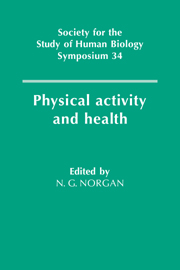Book contents
- Frontmatter
- Contents
- List of contributors
- Acknowledgements
- 1 Introduction
- 2 Comparative aspects of human activity
- 3 Physical activity levels – past and present
- 4 The validity of health measurements
- 5 Developments in the assessment of physical activity
- 6 Two national surveys of activity, fitness and health: the Allied Dunbar National Fitness survey and the Welsh Heart Health survey
- 7 Physical development and childhood activity
- 8 Physical activity and behavioural development during childhood and youth
- 9 Physiological aspects of activity and ageing
- 10 Activity and morale in later life: preliminary analysis from the Nottingham Longitudinal Study of Activity and Ageing
- 11 The benefits of low intensity exercise
- 12 Physical activity, obesity and weight maintenance
- 13 Adherence to physical activity and exercise
- 14 Women's working behaviour and maternal-child health in rural Nepal
- 15 Physical activity and psychological well-being
- 16 Leisure lifestyles: present and future
- Index
10 - Activity and morale in later life: preliminary analysis from the Nottingham Longitudinal Study of Activity and Ageing
Published online by Cambridge University Press: 05 December 2011
- Frontmatter
- Contents
- List of contributors
- Acknowledgements
- 1 Introduction
- 2 Comparative aspects of human activity
- 3 Physical activity levels – past and present
- 4 The validity of health measurements
- 5 Developments in the assessment of physical activity
- 6 Two national surveys of activity, fitness and health: the Allied Dunbar National Fitness survey and the Welsh Heart Health survey
- 7 Physical development and childhood activity
- 8 Physical activity and behavioural development during childhood and youth
- 9 Physiological aspects of activity and ageing
- 10 Activity and morale in later life: preliminary analysis from the Nottingham Longitudinal Study of Activity and Ageing
- 11 The benefits of low intensity exercise
- 12 Physical activity, obesity and weight maintenance
- 13 Adherence to physical activity and exercise
- 14 Women's working behaviour and maternal-child health in rural Nepal
- 15 Physical activity and psychological well-being
- 16 Leisure lifestyles: present and future
- Index
Summary
Physical activity has been associated with a variety of cognitive and behavioural changes which, collectively, allow the conclusion that regular exercise contributes to psychological as well as physical health (Folkins & Sime, 1981; Veale, 1987). Thus, while concern has not moved away entirely from whether certain types of exercise have psychological benefits (e.g. Hughes, 1984) considerable attention is now being paid to how these benefits are mediated, and at whom they might best be targeted. Retired and elderly people in particular are being seen increasingly as appropriate candidates for health promotion initiatives which, by increasing levels of physical activity (and, by implication, levels of physical fitness), aim broadly to improve quality of life.
In this context, levels of customary or habitual activity (as distinct from levels of formal exercise participation) are presumed to play an important part, and are now beginning to receive research attention (Shephard & Montelpare, 1988). At present, however, the empirical basis for activitybased health promotion initiatives among elderly people owes much to information derived from younger age groups. Certainly, as regards mental health, relatively little research has directly addressed the assumption that customary physical activity reliably contributes to psychological wellbeing in later life.
The Nottingham Longitudinal Study of Activity and Ageing was set up in 1983 to assess the role of lifestyle and Customary Physical Activity (CPA) in promoting and maintaining mental health and psychological well-being in later life.
- Type
- Chapter
- Information
- Physical Activity and Health , pp. 129 - 142Publisher: Cambridge University PressPrint publication year: 1992



